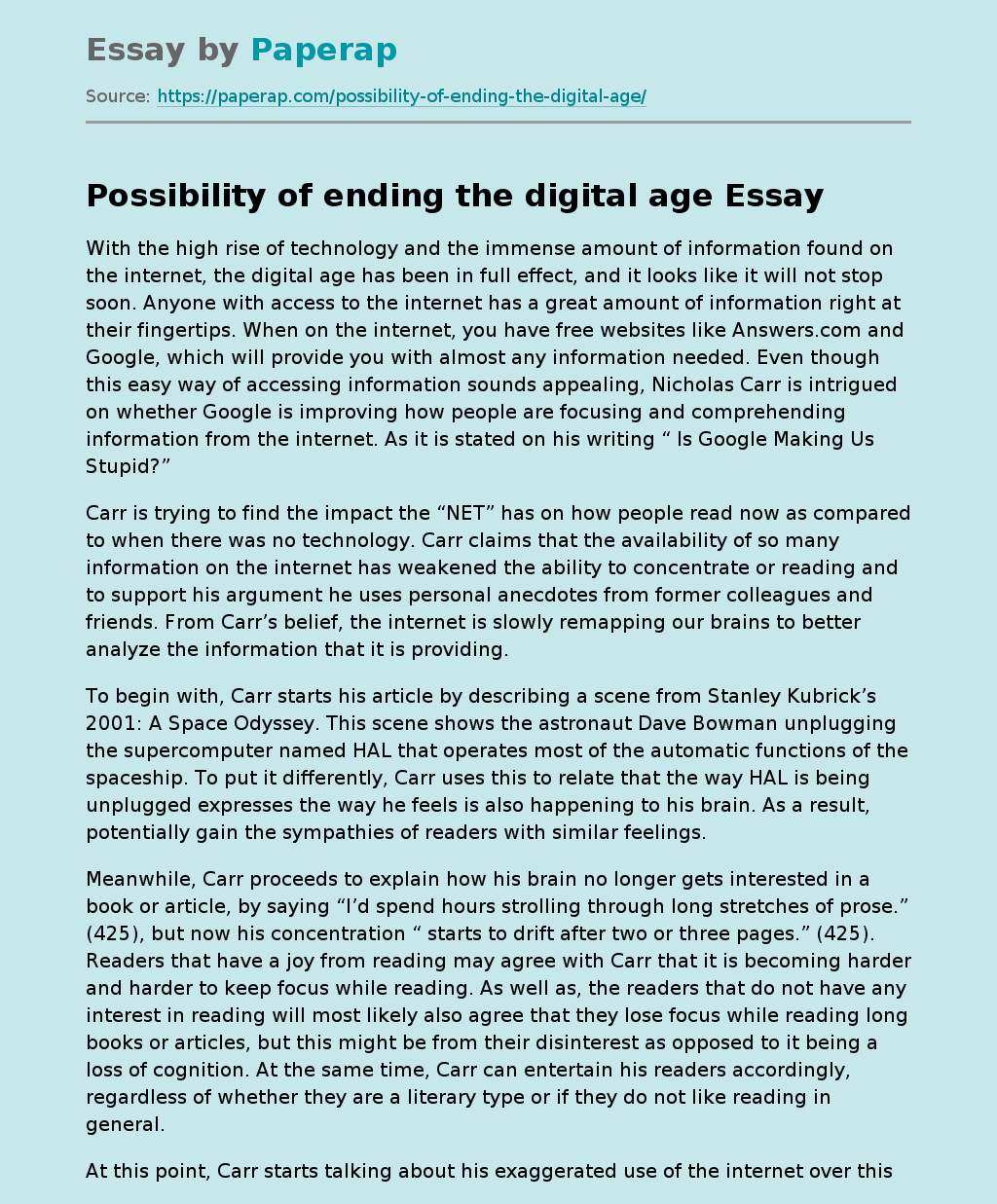Possibility of ending the digital age
With the high rise of technology and the immense amount of information found on the internet, the digital age has been in full effect, and it looks like it will not stop soon. Anyone with access to the internet has a great amount of information right at their fingertips. When on the internet, you have free websites like Answers.com and Google, which will provide you with almost any information needed. Even though this easy way of accessing information sounds appealing, Nicholas Carr is intrigued on whether Google is improving how people are focusing and comprehending information from the internet.
As it is stated on his writing “ Is Google Making Us Stupid?”
Carr is trying to find the impact the “NET” has on how people read now as compared to when there was no technology. Carr claims that the availability of so many information on the internet has weakened the ability to concentrate or reading and to support his argument he uses personal anecdotes from former colleagues and friends.
From Carr’s belief, the internet is slowly remapping our brains to better analyze the information that it is providing.
To begin with, Carr starts his article by describing a scene from Stanley Kubrick’s 2001: A Space Odyssey. This scene shows the astronaut Dave Bowman unplugging the supercomputer named HAL that operates most of the automatic functions of the spaceship. To put it differently, Carr uses this to relate that the way HAL is being unplugged expresses the way he feels is also happening to his brain.
As a result, potentially gain the sympathies of readers with similar feelings.
Meanwhile, Carr proceeds to explain how his brain no longer gets interested in a book or article, by saying “I’d spend hours strolling through long stretches of prose.” (425), but now his concentration “ starts to drift after two or three pages.” (425). Readers that have a joy from reading may agree with Carr that it is becoming harder and harder to keep focus while reading. As well as, the readers that do not have any interest in reading will most likely also agree that they lose focus while reading long books or articles, but this might be from their disinterest as opposed to it being a loss of cognition. At the same time, Carr can entertain his readers accordingly, regardless of whether they are a literary type or if they do not like reading in general.
At this point, Carr starts talking about his exaggerated use of the internet over this past decade, he also explains about how much more work had to be put in order find information, and that now it can be found in seconds with the help of search engines such as Google. He mentions that from his view the internet is what is causing him to lose focus. Carr puts his arguments out for his audience in a simple and very agreeable manner. He progressively works up his idea that the “NET” has weakened his ability to focus, and while he gradually works up this idea he makes some overall statements about the internet’s nature.
He talks about these natures in his text as it was said here “I’m as likely as not to be foraging in the Web’s info-thickets reading and writing e-mails, scanning headlines and blog posts, watching videos and listening to podcasts…” (425). These points he makes on the internet’s nature are so simple that is even hard to not agree with them. In addition, this helps readers believe that the argument Carr is proposing really is worth it. Carr mostly uses logical reasoning to persuade his audience, because providing factual evidence in order to support his claim would be nearly impossible.
Also, Carr uses personal anecdotes from his colleagues to help strengthen his argument. These anecdotes provide more information into the issue being discussed. If Carr were to be the only source of information, his argument would be less clear to agree with, but these anecdotes it gives his argument a sense that there really is a issue. This anecdotal evidence presented has both logical and emotional parts in this case. They do not provide certainty, but Carr uses them in order to provide some more evidence to his theory that the internet affects cognition. One of these is the statement from Bruce Friedman which states “I now have almost totally lost the ability to read and absorb a longish article on the web or in print,” (427).
This information gives the reader the temptation to make the same conclusions Carr did for this argument. Carr might be guilty of being biased and mispresenting the information, but in order to go on with his argument, he has done a great job in demonstrating emotional appeals. These evidences gathered from the personal anecdotes helps Carr transition his emotional writing very evenly to a more logically backed argument. He then states a study “conducted by scholars from University College London” (427) to provide more concrete support to his claims. This study helps strengthen Carr’s arguments since the article is fully fact-based after he has only been using emotional appeals. Carr organizes his article this way in order to reinforce the observations he has made. Now with this factual evidence in play the conclusions the readers drew earlier in the text are completely solid and strong now.
All things considered, Carr did an excellent job on the way that he presented pathos and logos throughout his article, which clearly allowed him to make a strong case on the effects the internet has on our cognition. Carr’s writing techniques that were used seemed very persuasive and suggestive. His emotional evidence presented made his readers think for some time, but he then uses logical evidence which then totally changed the tone and me his argument strengthen like cement.
Possibility of ending the digital age. (2021, Dec 03). Retrieved from https://paperap.com/possibility-of-ending-the-digital-age/

